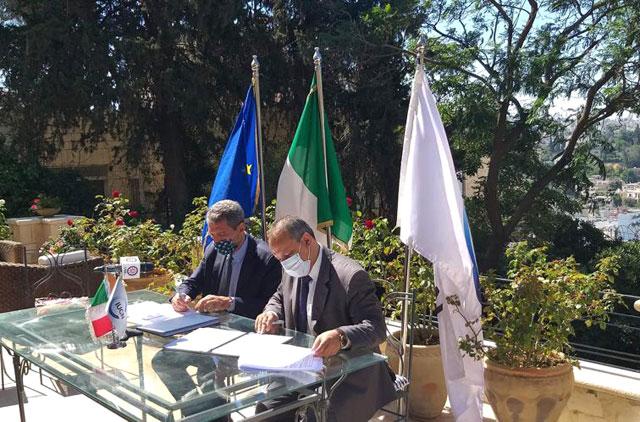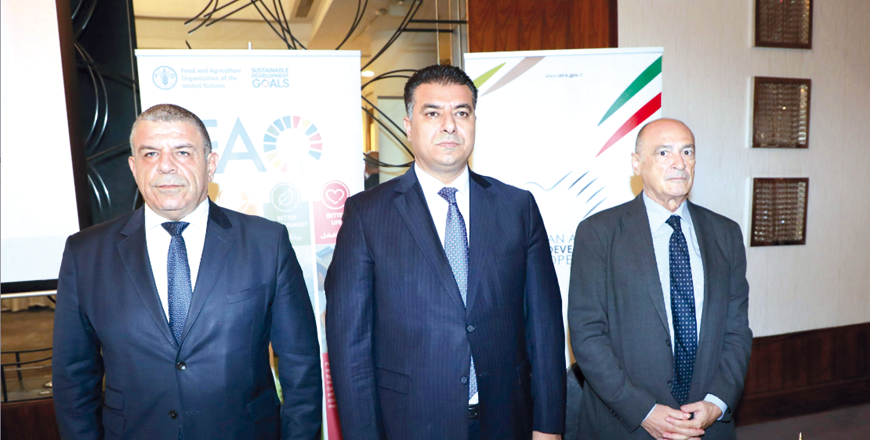You are here
Italy, IUCN launch AMER project for sustainable agriculture in Jordan
By JT - Aug 14,2023 - Last updated at Aug 14,2023

Italy’s Ambassador to Jordan Luciano Pezzotti and the International Union for Conservation of Nature (IUCN), represented by the Regional Director of the IUCN — ROWA Hany El Shaer during the signing of a partnership agreement in Amman on Monday (Photo courtesy of IUCN)
AMMAN — On Monday, the Italian government, represented by Italian Ambassador to Jordan Luciano Pezzotti, and the International Union for Conservation of Nature (IUCN), represented by the Regional Director of the IUCN — ROWA Hany El Shaer, signed a partnership agreement to launch the Italy-funded “Agricultural Management to Enable Resilience (AMER)” initiative in Jordan.
The two-year project, with a total budget of 1.5 million euros, seeks to enhance sustainable economic mechanisms in the agricultural sector and food security as a foundation for empowering Jordanian host communities and Syrian refugees in the southern areas of the country.
The initiative will be implemented in the Madaba and Karak governorates, benefiting about 2,700 citizens and Syrian refugees, including youth, women and smallholder farmers, according to a statement from the IUCN.
“Despite the progress made on economic development in Jordan, livelihood and food insecurity are particularly pervasive in more remote and rural areas,” said Ambassador Pezzotti. “In contribution to Jordan’s efforts to alleviate poverty and protect vulnerable segments of society, Italy has been providing funds for several initiatives aimed to increase sustainable livelihood through smallholder agricultural productivity and capacity building. This project is therefore fully aligned with the priorities set forth in the Italian Cooperation strategy, and is also harmonised with Jordan’s endeavours to reduce climate-related vulnerability through improved water management systems, in a country that experiences severe water scarcity.”
This project is aligned with IUCN’s vision to conserve nature and address socio-economic challenges. It is indeed designed to improve the living conditions of the beneficiaries by applying income-generating agricultural practices and sustainable production methods.
During the signing ceremony, Shaer said: “The IUCN is very pleased to open this new chapter of cooperation with the Italian government to improve and empower vulnerable local communities and Syrian refugees in the southern governorates of Jordan by introducing the water, energy and food security nexus.”
The initiative also seeks to foster the awareness and capabilities of communities, local authorities, academic institutions and schools in the targeted governorates in relation to sustainable agricultural practices and food security.
In addition, it aims to improve the knowledge and skills of smallholder farmers and breeders in the host communities, and as well as Syrian refugees in the targeted areas, to help them face climate change-related challenges.
Under the project, the IUCN will help establish hydroponic farming systems, support new and existing small projects in the agricultural sector for women and youth and establish water harvesting systems.
The first phase of the project, which was largely operational in Irbid and Mafraq governorates, concluded in 2022. More than a thousand Jordanians and Syrian refugees, including youth, women, and small-scale farmers, benefited from the first phase.
Related Articles
AMMAN — The Italian Government and the International Union for the Conservation of Nature (IUCN) signed a grant agreement at the Italian emb
AMMAN — The French Development Agency (AFD) and the International Union for the Conservation of Nature and Natural Resources (IUCN) signed a
AMMAN— The Ministry of Agriculture and the Food and Agriculture Organisation of the United Nations (FAO) launched a project on Wednesday aim


















